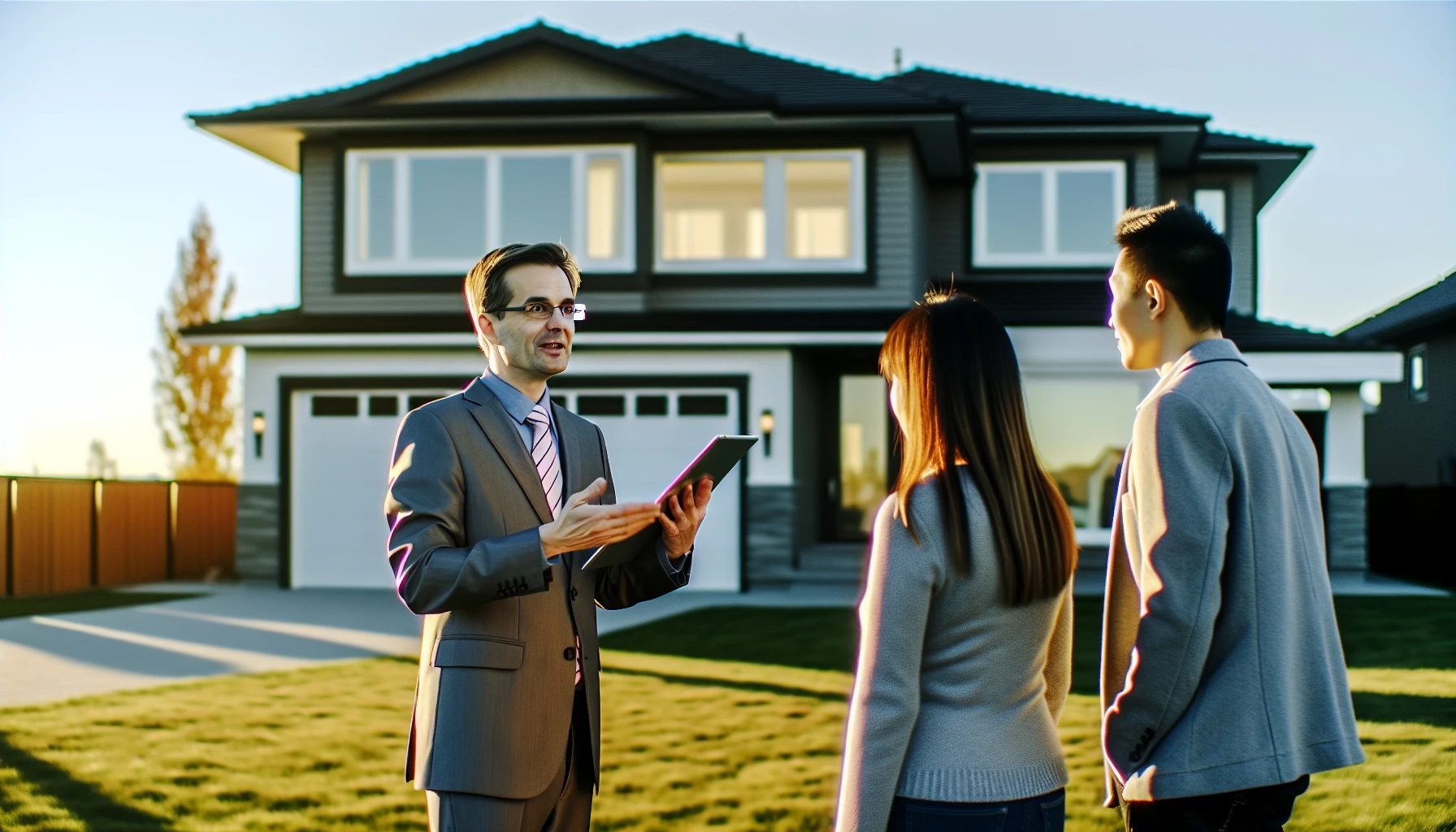Maximize Your Sales: 10 Proven Strategies for Effective Real Estate Landing Pages
In the competitive world of real estate, capturing leads and driving sales is crucial for success. So, how can you maximize your sales potential? The answer lies in creating high-converting effective real estate landing pages. Let’s explore the power of landing pages, their essential components, and how to optimize them to boost your real estate business.
Key Takeaways
Real estate landing pages are an effective tool for agents to capture leads and drive sales.
High-converting real estate landing pages require engaging headlines, visuals, copy and trust elements.
Optimizing organic search, running paid ads and using email marketing can increase lead generation.
The Power of Real Estate Landing Pages

Real estate landing pages play a key role in capturing leads and driving sales by delivering targeted content and lead capture forms. They act as a marketing tool, guiding potential clients to take action and become fully engaged with your real estate business. Real estate agents can greatly benefit from utilizing these landing pages to attract and convert potential clients, ultimately growing their real estate businesses.
One effective way to increase engagement and conversion rates is to create landing pages that are tailored for each segment of your target audience.
Targeted content
In the context of real estate landing pages, targeted content is information and messaging tailored to a particular audience or segment, addressing their specific needs, interests, and pain points. This strategy helps to attract and engage the right visitors, increasing the chances of converting them into leads or customers, thus creating a productive home search landing page.
Strong, high-quality visuals on real estate landing pages are necessary to convey their message effectively. The ideal landing page images should depict the local area that potential clients are either coming from or hoping to move to. A real estate agent working in Manhattan could use the city skyline as a landing page image. Alternately, they could choose to showcase an interior of a luxurious New York loft or a local coffee shop..
Using value-led follow-up sequences or targeted real estate drip email campaigns can offer insights into a prospect’s requirements. These strategies can help in creating a high converting landing page by nurturing leads and guiding them through the sales funnel, ultimately leading to higher engagement and conversion rates.
Lead capture forms
Lead capture forms on real estate landing pages gather visitor information, which are then converted into potential leads. Optimizing these forms and making them user-friendly can lead to a higher converting landing page driving more leads and sales.
The essentials should be requested in a lead capture form on a real estate landing page:
Name
Address
Email
Phone
Using well-designed landing page templates can help you create effective lead capture forms that encourage visitors to submit their information. A dedicated real estate landing page focused on capturing leads can enhance the chances of converting visitors into potential clients.
Key Components of High-Converting Real Estate Landing Pages

A successful realtor landing page commonly includes:
Engaging headlines
Appealing visuals
Concise yet informative copy
Elements contributing to trust building
These components work together to create an engaging and high-converting realtor landing page that drives leads and sales.
Compelling headlines
Compelling headlines serve to:
Capture visitors’ attention
Promote further exploration of the landing page
Be the first piece of content that visitors read
Capture attention and convey the value of the offer
A compelling headline for real estate landing pages should have:
Direct and attention-grabbing language
A transparent value proposition
Consistent messaging with the content
Simplicity over cleverness
Key benefits or points of the offer
A concise yet impactful message
An engaging headline can effectively communicate the value proposition of the offer and persuade visitors to take action, increasing overall engagement and conversion rates.
High-quality visuals

High-quality visuals, including images and videos, can enhance user experience and effectively display properties. Visually engaging content can not only capture the attention of visitors but also help them visualize and emotionally connect with the property.
For optimal results, it is recommended to:
Use high-quality images of the property, both interior and exterior shots, to showcase the property.
Implement image optimization for fast loading speed by compressing them and leveraging browser caching.
Place visually prominent hero images at the top of the landing page to draw attention.
Focusing on stunning imagery that encapsulates the essence of the property and creates a positive impression is also significant. Lastly, images should be used strategically to enhance the overall design and layout of the landing page.
Clear and concise copy
Clear and concise copy on landing pages delivers the value proposition and encourages visitors to take action. Ensuring the copy is easy to read, scannable, and compelling is significant.
To ensure effective copy for real estate landing pages, it is recommended to:
Identify your value proposition and communicate it clearly
Use simple and basic words to convey your message
Keep the content short and meaningful
Focus on the benefits of your product or service rather than just the features
Make the copy scannable and easy to read
End the landing page copy with a clear call-to-action
Incorporating storytelling techniques in the copy of a real estate landing page can:
Trigger emotions
Foster a connection between the viewer and the property
Make the copy more engaging and memorable
Provide social proof through compelling customer stories and testimonials
Increase its appeal and conversion potential.
Trust-building elements
Testimonials and social proof are effective elements for building trust that can reinforce credibility and enhance conversion rates. By showcasing positive experiences from past clients, potential leads are more likely to feel confident in your services and take the desired action.
Client testimonials are essential in establishing trust between site visitors and encouraging them to take action. They provide a sense of reliability and authenticity, which can be crucial in convincing site visitors to submit their contact information or request a property showing.
In addition, testimonials can also provide valuable insights into the quality of service provided, making potential clients more likely to choose your real estate business over competitors.
Top Real Estate Landing Page Examples
Studying top-performing real estate landing pages can yield insights into successful elements and areas needing improvement. Some high-achieving real estate landing pages include:
Mayer Realty GroupChime
Blair Marble Real Estate
Each of these landing pages showcases unique strengths, such as:
Captivating visuals
Clear calls-to-action
Personalized content
Effective lead capture forms
By analyzing these examples, you can gain inspiration and ideas for optimizing your own real estate landing page to maximize lead generation and sales.
Bear in mind, the most effective real estate landing pages are those tailored to the specific needs and preferences of your target audience. By combining the best practices and elements of these top-performing landing pages with your unique brand and value proposition, you can create a high converting landing page that drives results and helps grow your real estate business.
Customizing Your Real Estate Landing Page

Customizing real estate landing pages with consistent branding, personalization techniques, and A/B testing ensures optimal performance and conversion rates. By tailoring your landing page to your target audience and incorporating the best practices outlined in this guide, you can create a high-converting landing page that drives leads and sales for your real estate business.
Consistent branding
Maintaining consistent branding on real estate landing pages is vital for establishing and reinforcing your brand identity. It provides an opportunity to showcase your business in a manner that reflects your values and helps you stand out from the competition. Utilizing consistent branding elements such as colors, logo, and writing style helps to create a unified and professional image for your real estate business, which in turn increases credibility and builds trust with potential clients.
To effectively integrate your brand into your real estate landing page and create a cohesive and memorable user experience, we suggest the following strategies:
Implement simple search functionality that is prominently displayed on your landing page design.
Focus on stunning imagery that represents your brand and the properties you are selling.
Include engaging images and professional photos of your properties, as well as virtual walkthroughs.
Utilize clear and concise language to communicate your value proposition and benefits.
Incorporate any certifications, awards, or badges you’ve earned to build trust and credibility.
Personalization techniques
Personalization techniques like dynamic content and tailored offers can enhance engagement and conversion rates. By creating a more personalized and immersive experience for visitors, you can improve their engagement and likelihood of conversion, ultimately leading to higher sales and lead generation.
Dynamic content in regards to real estate landing pages involves the utilization of interactive and personalized elements to improve the user experience and engagement on the page. This can include features such as:
Dynamic text
Virtual tours
Maps
Mortgage calculators
High-quality images
Videos
Tailored offers on real estate landing pages refer to the practice of customizing content and offerings to match the specific needs and preferences of the target audience. This personalization can include:
Presenting time-sensitive offers
Providing relevant information and resources based on the buyer’s location or interests
Tailoring the messaging to specific buyer personas
A/B testing
A/B testing various landing page elements aids in identifying the most effective design and content to maximize conversions. By comparing two versions of a landing page with one element being varied, you can determine which version performs better and make data-driven decisions to optimize your landing page.
The process for conducting A/B testing on real estate landing pages involves:
Identifying the elements to be tested
Creating two versions of the landing page with one element being varied
Randomly allocating visitors to each version
Collating data on the performance of each version
Analyzing the data to ascertain the higher-performing version
Deploying the winning version
Repeating the process to continually optimize the landing page.
Utilizing A/B testing can help you improve the overall performance of your real estate landing page, driving more leads and sales for your business.
Driving Traffic to Your Real Estate Landing Page
Increasing visibility and lead generation on real estate landing pages can be achieved by driving traffic through organic search optimization, paid advertising, and email marketing. By leveraging these strategies, you can attract more visitors to your landing page, convert them into leads, and ultimately grow your real estate business.
Organic search optimization

Improving landing page rankings on search engines via organic search optimization can drive more traffic and potential leads. By implementing various strategies and techniques to optimize content, structure, and performance of the website, you can attract organic traffic from search engines and increase the visibility of your real estate landing page.
To optimize organic search for real estate landing pages, it is recommended to follow SEO landing page best practices to increase organic traffic and conversions. Here are the steps to take:
Define key performance indicators (KPIs) and conduct a technical audit.
Analyze competitors and perform keyword research.
Implement effective on-page optimization techniques.
Create high-quality, relevant content that provides value to users.
Optimize meta tags, headings, and URLs with targeted keywords.
Build high-quality backlinks from reputable websites.
Optimize for local search by including location-specific keywords.
Use schema markup to enhance search engine visibility.
Regularly monitor and analyze website performance to make necessary improvements.
By employing these organic search optimization strategies, you can improve the visibility and performance of your real estate landing page, driving more traffic and leads to your business.
To learn more about SEO for real estate agents, see our blog: https://www.quickcommissionadvance.com/blog/ultimate-guide-to-local-seo-for-real-estate-agents/
Paid advertising

Targeting specific audiences and driving traffic to landing pages can be achieved through paid advertising methods like Google Ads and social media ads. By investing in paid advertising, you can reach a larger audience, generate more leads, and increase the overall effectiveness of your real estate landing page.
Google Ads can provide a range of advantages, such as lead generation, enhanced visibility, tracking and analytics, A/B testing, and brand development. By following the steps to set up Google Ads for a real estate landing page, such as determining the target customer, identifying relevant keywords, creating separate landing pages and quizzes for different real estate offers, planning and budgeting the Google Ads campaign, writing compelling ad copy, setting up conversion tracking, and monitoring and optimizing ads, you can improve the performance of your real estate landing page and generate more leads.
Social media advertising for real estate landing pages entails:
Creating advertising campaigns on social networking sites such as Facebook or Google
Tailoring these campaigns to local customers
Facilitating the capture of contact details from potential customers
Promoting the landing page on social media platforms to reach a broader audience and generate leads.
Email marketing
Promoting landing pages to existing contacts through email marketing campaigns encourages them to avail of offers and services. By sharing the link to your landing page with subscribers who are already familiar with and have confidence in your business, you can generate more leads and grow your real estate business.
Some effective email marketing strategies for real estate landing pages include:
Promoting links to your email sign-up form on social media platforms
Offering incentives or valuable content to encourage visitors to sign up for your email list
Utilizing custom landing pages and opt-in forms to create highly effective lead generation funnels
Employing email marketing software that is simple and easy to use
Implementing both inbound and outbound marketing techniques to maximize your reach and engagement.
Measuring Real Estate Landing Page Success
Identifying areas for improvement and optimizing performance can be achieved by measuring real estate landing page success through conversion rates, bounce rates, and traffic sources. By analyzing these key metrics, you can ensure that your landing page is performing at its best and driving the maximum number of leads and sales for your real estate business.
Conversion rates
Conversion rates reflect the percentage of visitors who execute the desired action on a landing page, like submitting a lead capture form. By tracking and monitoring conversion rates, you can identify areas for improvement and optimize your landing page to maximize conversions and generate more leads for your real estate business.
Bounce rates
Bounce rates denote the percentage of visitors who exit the landing page without taking any action, suggesting potential issues with content or design. By monitoring bounce rates, you can identify areas for improvement and optimize your landing page to engage more visitors and drive more leads and sales.
Traffic sources
Identifying the most effective channels for driving traffic to real estate landing pages and informing future marketing strategies can be achieved by analyzing traffic sources. By understanding where your traffic is coming from and which sources are driving the most leads, you can focus your marketing efforts on the most effective channels and ultimately grow your real estate business.
Summary
In conclusion, creating high-converting real estate landing pages is crucial for capturing leads and driving sales in the competitive real estate market. By understanding the power of targeted content, lead capture forms, and key components like compelling headlines, high-quality visuals, clear and concise copy, and trust-building elements, you can optimize your landing page for maximum performance.
Additionally, customizing your landing page with consistent branding, personalization techniques, and A/B testing, as well as driving traffic through organic search optimization, paid advertising, and email marketing, will ensure your real estate landing page’s success. By implementing these strategies and continually measuring the performance of your landing page, you’ll be well on your way to growing your real estate business and achieving greater success.
Frequently Asked Questions

What is landing pages for real estate?
Real estate landing pages are sites that visitors land on after clicking an ad for your business or organization, aimed at turning web traffic into customers through some form of action.
How do I create a landing page for my realtor?
Create a professional landing page for your real estate business by utilizing a strong headline, an enticing offer, a clear call to action, social proof, a lead capture form and search function, honest copy, testimonials, the benefits of your offer, and personalizing the content.
Are landing pages still a thing?
Yes, landing pages are still a thing, used in Google Ads and Analytics. However, landing pages usually refer to campaign-specific pages with one call to action and no website navigation.
How much should a landing page cost?
Creating a landing page can cost anywhere from $600 to $3,000 depending on the complexity and desired outcomes of the project. Generally, businesses invest between $75 and $3000 for a single page design.
How can I optimize my real estate landing page for organic search?
Optimize your real estate landing page for organic search by implementing SEO best practices, conducting keyword research, creating high-quality content, and building backlinks from reputable websites.






